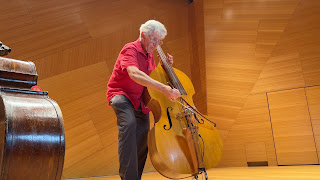Mark Dresser with his bass (photograph by Patrick Paxson)
According to my records, my only previous encounter with a recording by jazz bassist Mark Dresser took place in February of 2020, when I wrote about the album Ain’t Nothing But A Cyber Coup & You performed by his combo, the Mark Dresser Seven. As the hyperlink indicates, this album is still available from Amazon.com. Ironically, however, there is no sign of it on the Full Discography Web page on Dresser’s Web site.
This past Friday, Pyroclastic Records released Dresser’s latest album, Tines of Change. This is Dresser’s sixth “solo” album; but those scare quotes are there for a reason. Dresser is the only performer, but his performance discloses a wealth of multi-dimensional sonic possibilities that one does not usually associate with the double bass. In fact his instrument has been enhanced with a variety of adaptations. Those adaptations are the results of Dresser’s groundbreaking sonic research, whose theories were then but into practice by luthier Kent McLagan altering his instrument. This justifies the first sentence in the booklet notes that Dresser provided: “I think of the bass as an orchestra.”
The album has twelve tracks, each of which has a somewhat cryptic title. Each track title begins with a reference to musical form, such as “Prologue,” “Harmony,” and even “Gregorian chant.” Dresser then bisects the term and adds a suffix whose semantics are puzzling at best: “-tine,” “-logue,” and “-ity” as representative examples. It would seem that he is interested in playing musical mind games with his listener, rather in the same way that Ain’t Nothing But A Cyber Coup & You was playing political mind games with the titles of its tracks.
Personally, I am happy to experience the “surface structure” of the diverse sonorities on Tines of Change. If I want to start digging into technical details, Dresser’s booklet essay certainly knows how to point me down a useful path. On the other hand, I do not see anything wrong with an attentive listener accepting all of that diversity for what it is, without worrying about how all those sonorities were created. Dresser clearly sees himself as pushing the concept of “invention” in new directions; but the attentive listener should not feel obliged to seek out a causal infrastructure! In the spirit of T. S. Eliot, one should not bother to ask “What is it?”


No comments:
Post a Comment